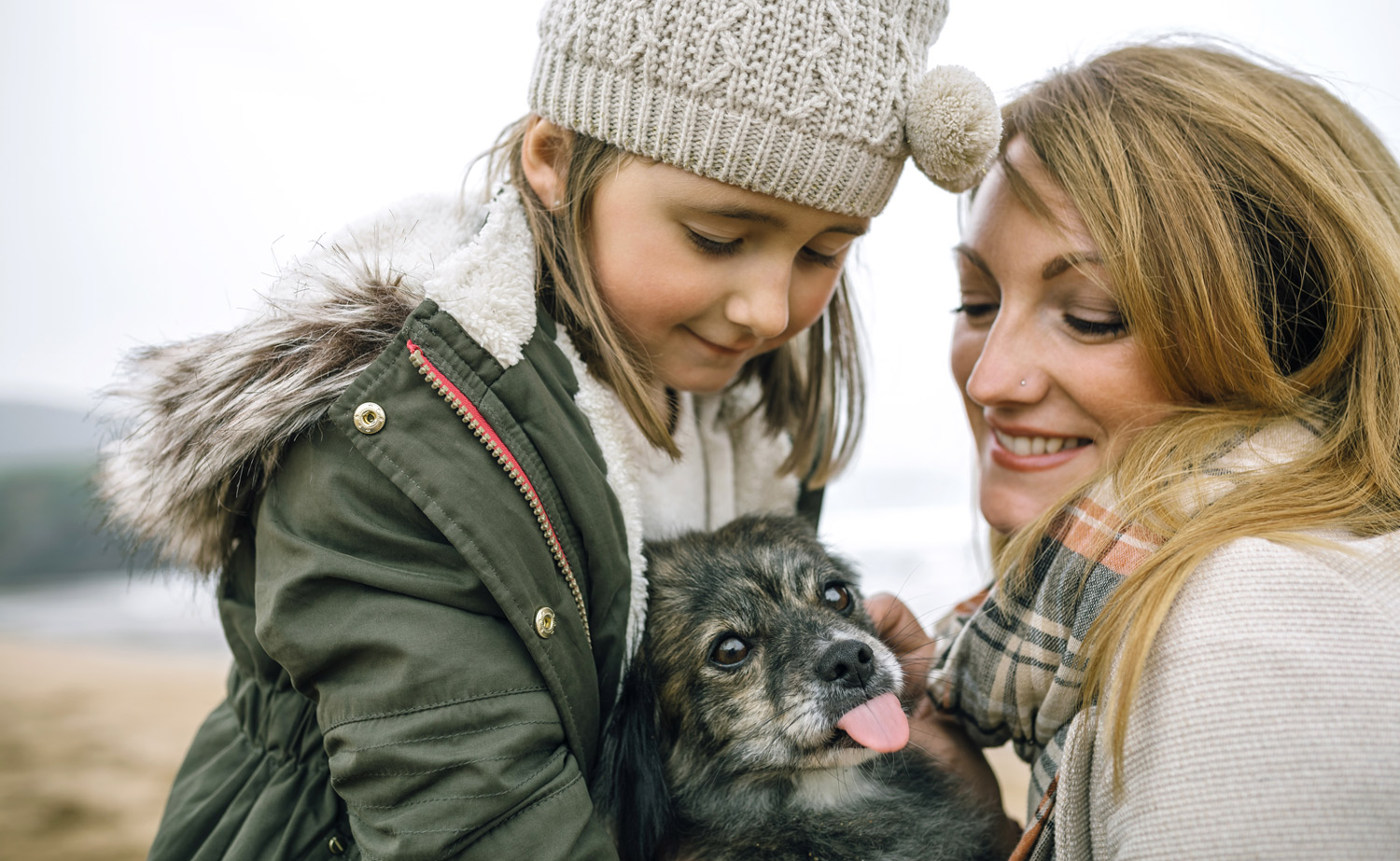Winter hints for pets
Preparing for winter involves more than just bundling up in cosy blankets. Follow this checklist of winter hints for pets to ensure your pets are ready for the cold:
- Grooming: Regular grooming helps maintain your pet’s coat and facilitates effective temperature regulation. Brushing helps remove dead fur and promotes better air circulation around the skin, keeping your pet warmer.
- Identification: Ensure your pet’s identification tags are up to date. This is particularly important if you plan on engaging in outdoor activities. In case your pet gets lost, a properly updated tag increases the chances of a safe return.
Indoor Environments and Hygiene
Use these winter hints for pets to create a warm and comfortable indoor environment is essential to keep your pets cosy during winter:
- Warmth: Provide your pets with a designated cozy space indoors, away from drafts. Consider using pet beds, blankets, or heated pads to offer extra warmth.
- Humidity: Maintaining proper humidity levels helps prevent dry skin and respiratory issues. Use a humidifier or place a bowl of water near a heat source to add moisture to the air.
- Bathing and Dental Care: Regular bathing helps keep your pet’s skin clean and free from dryness. Additionally, pay attention to dental hygiene as winter months often lead to a decrease in water consumption, which can impact oral health.
Outdoor Safety Measures
While indoor warmth is essential, pets still need to venture outside. Follow these safety measures to protect them from the hazards of winter:
- Chemical Exposure: Winter chemicals like antifreeze pose a significant risk to pets. Ensure all chemicals are stored securely, and clean up any spills immediately. Consider using pet-friendly alternatives.
- Outdoor Areas: Regularly inspect your outdoor areas for potential dangers. Remove any sharp objects, ensure fences are secure, and prevent access to bodies of water.
- Winter Gear: Invest in proper winter gear for your pets, such as booties and jackets. These accessories provide insulation and protect them from cold temperatures and icy surfaces.
Exercise and Mental Stimulation
Regular exercise is vital for your pet’s physical and mental well-being, even during winter:
- Physical Exercise: Engage your pet in regular exercise sessions to keep them active and healthy. Go for brisk walks, play interactive games like fetch indoors, or consider visiting indoor pet-friendly spaces.
- Indoor Activities: Winter is an excellent time to introduce indoor games and puzzles. Treat puzzles, hide-and-seek, and interactive toys can keep your pet mentally stimulated and prevent boredom.
- Training Sessions: Utilize the time indoors to work on training and obedience sessions. Mental stimulation through training exercises strengthens the bond between you and your pet while keeping their minds sharp.
Nutrition and Hydration
Proper nutrition and hydration are crucial during the winter months. Consider the following tips:
- Balanced Diet: Consult your veterinarian to determine if adjustments are necessary based on your pet’s activity level. A balanced diet ensures optimal health and helps maintain a healthy weight during winter.
- Hydration: Encourage your pet to drink an adequate amount of water, even if their water consumption decreases. Provide fresh water at room temperature and consider adding wet food to their diet to supplement hydration.
Common Winter Health Issues
Winter brings specific health concerns for pets. Be aware of the following issues and take prompt action if necessary:
- Hypothermia: Watch for signs of hypothermia, including shivering, pale gums, lethargy, and weakness. If suspected, wrap your pet in warm blankets and seek immediate veterinary assistance.
- Frostbite: Extremities such as ears, paws, and tails are susceptible to frostbite. Look for pale or discolored skin, cold areas to the touch, pain, or blisters. Consult your veterinarian if frostbite is suspected.
Conclusion
Winter can be a challenging time for our pets, but with proper preparations and care, we can ensure their safety, comfort, and happiness throughout the colder months. By following the winter hints and tips provided in this guide, you’ll be well-equipped to protect your furry friends from the cold and create a warm and loving environment in which they’ll thrive. Stay vigilant, prioritize their well-being, and enjoy the winter season together.
FAQ (Frequently Asked Questions)
How can I protect my pet’s paws from the cold?
Winter pet boots and paw balms can provide protection against cold surfaces. Additionally, wiping your pet’s paws after walks can remove any ice or harmful substances they may have come in contact with.
Is it necessary to adjust my pet’s diet during winter?
Depending on your pet’s activity level, you may need to adjust their diet accordingly. Consult your veterinarian to determine the appropriate feeding portions to maintain a healthy weight.
Can I use human winter clothing on my pet?
While it may seem cute, human clothing may not provide the necessary insulation or freedom of movement for pets. Invest in proper pet winter gear to ensure their comfort and safety.
What signs should I watch for to identify frostbite in my pet?
Look out for pale or discolored skin, cold extremities, pain or discomfort when touched, or blisters. If you suspect frostbite, contact your veterinarian immediately.
Are there any indoor activities to keep my pet mentally stimulated?
Yes, there are various indoor activities you can engage in with your pet, such as treat puzzles, hide-and-seek games, or training sessions. These activities provide mental stimulation and strengthen the bond between you and your pet.
How can I prevent my pet from ingesting harmful chemicals like antifreeze?
Keep all winter chemicals, including antifreeze, out of reach of pets. Clean up any spills immediately and consider using pet-friendly antifreeze alternatives.

